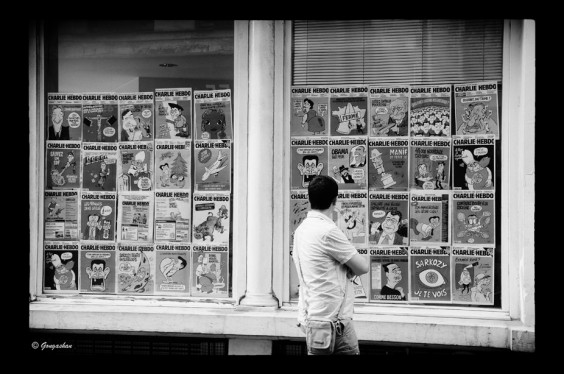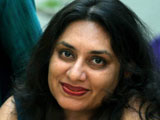Charlie Hebdo and the PEN Award
by Bina Shah / May 12, 2015 / 2 Comments

A viewer examines Charlie Hebdo magazine covers. Photo via Flickr user: Gongashan.
PEN America fails to recognize the toll Charlie Hebdo’s caricatures take on human dignity.
In May, controversy arose over PEN America’s decision to give Charlie Hebdo a “freedom of expression courage” award after the murder of twelve of its staffers by Islamic extremists in Paris early this year. 145 writers decided to protest this decision, saying that Charlie Hebdo’s cartoons were offensive to the already-beleaguered Muslims community in France, and that they did not want to endorse this stance.

- Pakistan is a country of contradictions – full of promise for growth, modernity and progress, yet shrouded by political, social and cultural issues that undermine its quest for identity and integrity. My bi-monthly column “Pakistan Unveiled” presents stories that showcase the Pakistani struggle for freedom of expression, an end to censorship, and a more open and balanced society.

- Bina Shah is a Karachi-based journalist and fiction writer and has taught writing at the university level. She is the author of four novels and two collections of short stories. She is a columnist for two major English-language newspapers in Pakistan, The Dawn and The Express Tribune, and she has contributed to international newspapers including The Independent, The Guardian, and The International Herald Tribune. She is an alumnus of the International Writers Workshop (IWP 2011).
Writers like Junot Diaz, Joyce Carol Oats, Michael Ondtaaje, and Michael Cunningham all signed a protest letter, while other writers, like Salman Rushdie, expressed their dismay at the protest. I’m not in the same league as these world-renowned writers but I find the controversy puts me in an odd place as both a supporter of freedom of expression and a practicing Muslim who believes that visual representations of the Prophet Muhammed are best avoided.
On Twitter, I witnessed an argument between some of my journalist colleagues in Pakistan and a journalist colleague in Scotland who had lived in France for seven years. The Pakistanis argued that Charlie Hebdo’s portrayal of racial minorities is, well, racist. The Scottish colleague said that Charlie Hebdo’s context came from the great European tradition of leftism, which espoused a working-class rebellious attitude to pour scorn over all establishment figures. It used racist imagery to criticize the racist attitudes of the establishment. Clergy of all religions—Christian, Jewish, Muslim—were all a part of that establishment, and so all of them were open to being satirized by Charlie Hebdo.
This satirical tradition in France grew out of the student protests in 1968, which left a lasting impression on generations of French people. When the Charlie Hebdo massacres occurred, I commiserated with the director of the Alliance Francaise in Karachi, Jean-Francois Chenin. He wrote back, “I feel as though my youth has been killed.” In 2015, this tradition of collective solidarity based on socialist principles is dying out, replaced everywhere in Europe with a more American individualism. Perhaps this is why Charlie Hebdo itself was doing poorly, until the massacres in January brought world attention and financial support to the magazine.
The social fabric of Europe has changed too, with Muslims now being one of the largest minority groups in France. While the general impression of Muslims in France is that they are disenfranchised, oppressed and living on the margins of French life, many are educated middle class members of French society who actually espouse the anti-clergy stance of Charlie Hebdo. There were at least two Arab-origin staffers at Charlie Hebdo, one of whom was killed in the attacks. Muslims, too, find themselves in a strange place in today’s France, where many have assimilated and live normal lives. Yet the banlieues of Paris house many disaffected youth who find their solace in petty crime and radical Islam, the latter being another one of Charlie Hebdo’s targets.
Back to Charlie Hebdo and the PEN award: I find myself unable to endorse the award because I do feel the image of my prophet is sacrosanct. Intellectually, I understand what Charlie Hebdo was trying to do when it lampooned religious figures held dear by people of different faiths. Still, PEN’s claim that the intent of Charlie Hebdo’s cartoons “was not to ostracize or insult Muslims but rather to reject forcefully the efforts of a small minority of radical extremists to place broad categories of speech off limits” reminds me of the head of a company I once worked for. In general meetings, he would berate me for something I’d done wrong as a way of criticizing my immediate boss. It was a strange, indirect way of conducting business. I was powerless to do anything about it because I was young, inexperienced, and vulnerable, and because the company head and my boss were both much older, male figures that I couldn’t relate to very well at all.
I used to attend those meetings with a feeling of fear and dread, knowing that at any moment the company head would bring negative attention to me, a relatively unimportant figure, in order to make a point to my boss. For hours after the meeting I would feel terrible, even as I knew the criticism wasn’t directly meant for me. I have never forgotten the humiliation of those times, even though it’s been nearly fifteen years. I suspect that’s how France’s Muslims feel every time Charlie Hebdo publishes another cartoon of the Prophet.
So shower Charlie Hebdo with all the awards in the universe, but know that this kind of freedom of expression extracts a certain price on human dignity.





2 Comments on "Charlie Hebdo and the PEN Award"
Curious. I’m muslim and I have no problems with depictions of any kind. It doesn’t affect my dignity. The ignominy, if indeed there is any, is when I am lumped into this strange, essentialized group called “Muslim community”, which may as well be called “die volksgemeinschaft”. I never know where I am with ‘das volk’. And that is the real dilemma of our life and times. Our place, as we see it, is not at all determined by us. I may be part of the community today, I may be shunned tomorrow. It is not up to me at all. My existence, the fact that I breathe, might offend someone somewhere. And if that someone is powerful enough, if that someone calls the shots within das volk, I may as well be gunned down in the streets with impunity.
Back to the depictions. There is a long history here. A long and contentious history. The sacrilegious aspect is not a “muslim” tradition. It’s an arab tradition. There are plenty of beautiful persian and turkish murals from the 13th century onwards that have all forms of religious and devotional depictions. There’s an article by Emma Graham-Harrison which explores this in detail (in case anyone’s interested).
As for Charlie Hebdo. I do think there are double standards operating within the magazine (they have to sell it after all). Charlie is known not to satirize certain aspects of history. They’re particularly quiet on the occupation years. Granted it’s not current events, but if it’s equal opportunity offense, then why not? Like any narrative, Charlie has biases. They just refuse to acknowledge that simple fact. Should they be criticized for it? Sure. Should their staffers be threatened and killed? No. Should they win a prize? Meh.
Such a great observation, q. See my previous column about the murder of Avijit Roy. So true when you say that just drawing breath may offend somebody somewhere…